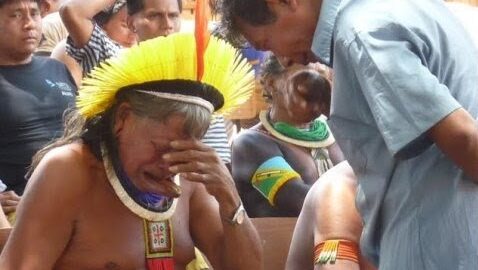In February the president of Brazil, Dilma Rousseff, approved the construction of the Belo Monte hydroelectric plant in Xingu River that will flood 18,000 kilometers and reach 12 indigenous lands. Dilma (as the Brazilians call her) made Raoni, chief of the Kayapo people, cry as he was trying to stop this big project since 1989.
by Magda Pucci
The major complaints are about the environmental problems and the neglect of the rights of the indigenous population that lives in Xingu area – an indigenous reserve demarcated in the sixties by the Villas-Boas Brothers. Last week, Xingu, the movie was released in Brazil after an avant première in Berlin and in Manaus Cinema Festival. Xingu is an indigenous reserve demarcated in the sixties by Villas-Boas Brothers. The movie will tell the adventures of brothers Claudio, Orlando and Leonardo Villas-Boas during an expedition to protect the Indigenous peoples – which culminated into the creation of the Xingu National Park. Surely, the movie will heat up the discussion over the Belo Monte Plant.
The director and producer of the movie, Cao Hamburger and Fernando Meirelles are very worried about Belo Monte. Hamburger believes that:
“Belo Monte will be one of the major Brazilian errors […] the electricity generated by hydropower, with a maximum of 11,233 megawatts of power, will serve to feed the pulp industry, steel and aluminum.” (Plattform Belo Monte and Xingu Otomo)
“I imagine that, at the time (1960’s), our pragmatic president would not allow Xingu National Park to exist with its forests and more than 50 tribes with their culture preserved.”
Hamburger, is also not convinced of the kind of progress Brazil is choosing. He said during the release of the film in Manaus:
“It is an old model kind of progress. I do not know if it’s wrong, but it is old, based on the Industrial Revolution.“
In his blog, Fernando Meirelles said that if Dilma Roussef was president in the 1950’s, Parque Xingu would never exist. In a scene from the Xingu film, while defending the construction of the TransAmazônica – Railway that would pass in the middle of an indigenous village, a militar tells to Orlando Villas Boas: – Orlando, take the Indians out there. Progress is good for everyone. – No, it is not. – answered the Orlando -I can not even know if it’s good for us. Meirelles ended his post giving a message to Dilma: “Dream a little, president, or at least listen to the dreams of those who can dream”.
Not only Meirelles and Hamburger are worried about Belo Monte. Sting had done, in 1989 a manifest against, and recently, the filmmaker James Cameron implored to president Lula to stop the project when he went to Amazonas to participate into an Environmental Conference. Avatar, his last film, showed how the humans arbitrarily exploit the natural resources of the planet (Pandora) to its depletion. The metaphor is interesting. (BR Press)
Also, the indigenous peoples are doing many protests against Belo Monte. Dilma Rousseff and her staff will not be swayed. For economical and prestigious reasons the Belo Monte plant will come into reality whether it will be devastating or not. Some are certain that it is already a disaster.
Ironical name, Belo Monte means ‘beautiful mount’…
The discussion about the plant has been going on for more than thirty years. Here you can read an historical overview and find more information about it.

It’s horrible. Such a big world and a “certain kind” of people don’t know how to control their own population. Instead they have to build over gods perfect nature and genocide people because they are sick in the mind. Seems like they are the ones who should be destroyed to preserve this earth. Not the Indian tribes.